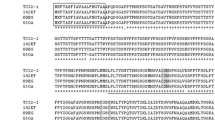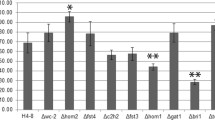Abstract
Fungi are considered model organisms for the analysis of important phenomena of eukaryotes. For example, some of them have been described as models to understand the phenomenon of multicellularity acquisition by different unicellular organisms phylogenetically distant. Interestingly, in this work, we describe the multicellular development in the model fungus S. reilianum. We observed that Sporisorium reilianum, a Basidiomycota cereal pathogen that at neutral pH grows with a yeast-like morphology during its saprophytic haploid stage, when incubated at acid pH grew in the form of multicellular clusters. The multicellularity observed in S. reilianum was of clonal type, where buds of “stem” cells growing as yeasts remain joined by their cell wall septa, after cytokinesis. The elaboration and analysis of a regulatory network of S. reilianum showed that the putative zinc finger transcription factor CBQ73544.1 regulates a number of genes involved in cell cycle, cellular division, signal transduction pathways, and biogenesis of cell wall. Interestingly, homologous of these genes have been found to be regulated during Saccharomyces cerevisiae multicellular growth. In adddition, some of these genes were found to be negatively regulated during multicellularity of S. reilianum. With these data, we suggest that S. reilianum is an interesting model for the study of multicellular development.






Similar content being viewed by others
References
Arias Del Angel JA, Escalante A, Martínez-Castilla L et al (2017) An evo-devo perspective on multicelular development of Myxobacteria. J Exp Zool Part B Mol Dev Evol 328:165–178. https://doi.org/10.1002/jez.b.22727
Banuett F, Herskowitz I (1994) Morphological transitions in the life cycle of Ustilago maydis and their genetic control by the a and b loci. Exp Mycol 18:247–266. https://doi.org/10.1006/emyc.1994.1024
Bhaskaran S, Smith RH (1993) Carbohydrates, inertase activity, growth and dimorphism in Sporisorium reilianum. Mycopathologia 122:35–41. https://doi.org/10.1007/BF01103707
Biernaskie JM, West SA (2015) Cooperation, clumping and the evolution of multicellularity. Proc Biol Sci 282:20151075. https://doi.org/10.1098/rspb.2015.1075
Bonner JT (1998) The origins of multicellularity. Integr Biol 1:27-36. https://doi.org/10.1002/(SICI)1520-6602(1998)1:1<27::AID-INBI4>3.0.CO;2-6..
Boraas M, Seale D, Boxhorn J (1998) Phagotrophy by a flagellate selects for colonial prey: a posible origin of multicellularity. Evol Ecol 12:153–164. https://doi.org/10.1023/A:1006527528063
Busch S, Braus GH (2007) How to build a fungal fruit body: from uniform cells to specialized tissue. Mol Microbiol 64:873–876. https://doi.org/10.1111/j.1365-2958.2007.05711.x
Chávez-Munguía B, Martínez-Palomo A (2011) High-resolution electron microscopical study of cyst walls of Entamoeba spp. J Eukaryot Microbiol 58:480–486. https://doi.org/10.1111/j.1550-7408.2011.00576.x
Du Z, Zhang Y, Li L (2015) The yeast prion [SWI(+)] abolishes multicellular growth by triggering conformational changes of multiple regulators required for flocculin gene expression. Cell Rep 13:2865–2878. https://doi.org/10.1016/j.celrep.2015.11.060
Grosberg RK, Strathmann RR (2007) The evolution of multicellularity: a minor major transition? Annu Rev Ecol Evol Syst 38:621–654. https://doi.org/10.1146/annurev.ecolsys.36.102403.114735
Holliday R (1974) Ustilago maydis. In: King RC (ed) The handbook of genetics. Plenum Press, New York, pp 575–595
Kelly MT, MacCallum DM, Clancy SD, Odds FC, Brown AJ, Butler G (2004) The Candida albicans CaACE2 gene affects morphogenesis, adherence and virulence. Mol Microbiol 53:969–983. https://doi.org/10.1111/j.1365-2958.2004.04185.x
Kessin RH, Gundersen GG, Zaydfudim V, Grimson M (1996) How cellular slime molds evade nematodes. Proc Natl Acad Sci U S A 93:4857–4861. https://doi.org/10.1073/pnas.93.10.4857
Klose J, de Sá MM, Kronstad JW (2004) Lipid-induced filamentous growth in Ustilago maydis. Mol Microbiol 52:823–835. https://doi.org/10.1111/j.1365-2958.2004.04019.x
Knoll A (2011) The multiple origins of complex multicellularity. Annu Rev Earth Planet Sci 39:217–239. https://doi.org/10.1146/annurev.earth.031208.100209
Koschwanez JH, Foster KR, Murray A (2011) Sucrose utilization in budding yeast as a model for the origin of undifferentiated multicellularity. PLoS Biol 9:e1001122. https://doi.org/10.1371/journal.pbio.1001122
Kruger NJ (1994) The Bradford method for protein quantitation. Methods Mol Biol 32:9–15. https://doi.org/10.1385/0-89603-268-X:9
Kües U, Navarro-González M (2015) How do Agaricomycetes shape their fruiting bodies? morphological aspects of development. Fungal Biol Rev 29:63–97. https://doi.org/10.1016/j.fbr.2015.05.001
León-Ramírez CG, Cabrera-Ponce JL, Martínez-Soto D, Sánchez-Arreguin A, Aréchiga-Carvajal ET, Ruiz-Herrera J (2017) Transcriptomic analysis of basidiocarp development in Ustilago maydis (DC) Cda. Fungal Genet Biol 101:34–45. https://doi.org/10.1016/j.fgb.2017.02.007
Martinez C, Roux C, Jauneau A, Dargent R (2002) The biological cycle of Sporisorium reilianum f. sp. Zeae: an overview using microscopy. Mycologia 94:505–514. https://doi.org/10.2307/3761784
Martínez-Soto D, Velez-Haro JM, León-Ramírez CG, Ruiz-Medrano R, Xoconostle-Cázares B, Ruiz-Herrera J (2019) The cereal phytopathogen Sporisorium reilianum is able to infect the non-natural host Arabidopsis thaliana. Eur J Plant Pathol 153:417–427. https://doi.org/10.1007/s10658-018-1567-8
Maynard-Smith J, Szathmary E (1995) Major transitions in evolution. Spektrum, New York
Mora van Cauwelaert E, Arias Del Angel J, Benítez M et al. (2016) Physicochemical factors in the organization of multicellular aggregates and plants. In: Niklas K, Newman S (eds) Multicellularity: origins and evolution, The MIT Press, Vienna, pp71-85.
Mowat E, Williams C, Jones B et al (2019) The characteristics of Aspergillus fumigatus mycetoma development: is this a biofilm? Med Mycol 47:S120–S126. https://doi.org/10.1080/13693780802238834
Nagy LG, Kovács GM, Krizsán K (2018) Complex multicellularity in fungi: evolutionary convergence, single origin, or both? Biol Rev Camb Philos Soc 93:1778–1794. https://doi.org/10.1111/brv.12418
Niklas KJ (2014) The evolutionary-developmental origins of multicellularity. Am J Bot 101:6–25. https://doi.org/10.3732/ajb.1300314
Oud B, Guadalupe-Medina V, Nijkamp JF, de Ridder D, Pronk JT, van Maris A, Daran JM (2013) Genome duplication and mutations in ACE2 cause multicellular, fast-sedimenting phenotypes in evolved Saccharomyces cerevisiae. Proc Natl Acad Sci U S A 110:E4223–E4231. https://doi.org/10.1073/pnas.1305949110
Palande AS, Kulkarni SV, León-Ramírez C et al (2014) Dimorphism and hydrocarbon metabolism in Yarrowia lipolytica var. indica. Arch Microbiol 196:545–556. https://doi.org/10.1007/s00203-014-0990-2
Palomeros-Suárez PA, Massange-Sánchez JA, Sánchez-Segura L et al (2017) AhDGR2, an amaranth abiotic stress-induced DUF642 protein gene, modifies cell wall structure and composition and causes salt and ABA hyper-sensibility in transgenic Arabidopsis. Planta 245:623–640. https://doi.org/10.1007/s00425-016-2635-y
Pfeiffer T, Bonhoeffer S (2003) An evolutionary scenario for the transition to undifferentiated multicellularity. Proc Natl Acad Sci U S A 100:1095–1098. https://doi.org/10.1073/pnas.0335420100
Poloni A, Schirawski J (2016) Host specificity in Sporisorium reilianum is determined by distinct mechanisms in maize and sorghum. Mol Plant Pathol 17:741–754. https://doi.org/10.1111/mpp.12326
Ratcliff WC, Frankhauser JD, Rogers DW et al (2015) Origins of multicellular evolvability in snowflake yeast. Nat Commun 6:6102. https://doi.org/10.1038/ncomms7102
Rensing SA (2016) (Why) Does evolution favour embryiogenesis? Trends Plant Sci 21:562–573. https://doi.org/10.1016/j.tplants.2016.02.004
Rivera-Yoshida N, Arias Del Angel JA, Benítez M (2018) Microbial multicellular development: mechanical forces in action. Curr Opin Genet Dev 51:37–45. https://doi.org/10.1016/j.gde.2018.05.006
Rokas A (2008) The origins of multicellularity and the early history of the genetic toolkit for animal development. Annu Rev Genet 42:235–251. https://doi.org/10.1146/annurev.genet.42.110807.091513
Ruiz-Herrera J, León-Ramírez CG, Guevara-Olvera L et al (1995) Yeast-mycelial dimorphism of haploid and diploid strains of Ustilago maydis. Microbiology 141:695–703. https://doi.org/10.1099/13500872-141-3-695
Saporito-Irwin SM, Birse CE, Sypherd PS, Fonzi WA (1995) PHR1, a pH-regulated gene of Candida albicans, is required for morphogenesis. Mol Cell Biol 15:601–613. https://doi.org/10.1128/MCB.15.2.601
Shannon P, Markiel A, Ozier O, Baliga NS, Wang JT, Ramage D, Amin N, Schwikowski B, Ideker T (2003) Cytoscape: a software environment for integrated models of bio molecular interaction networks. Genome Res 13:2498–2504. https://doi.org/10.1101/gr.1239303
Smukalla S, Caldara M, Pochet N, Beauvais A, Guadagnini S, Yan C, Vinces MD, Jansen A, Prevost MC, Latgé JP, Fink GR, Foster KR, Verstrepen KJ (2008) FLO1 is a variable green beard gene that drives biofilm-like cooperation in budding yeast. Cell 135:726–737. https://doi.org/10.1016/j.cell.2008.09.037
Soares EV (2011) Flocculation in Saccharomyces cerevisiae: a review. J Appl Microbiol 110:1–18. https://doi.org/10.1111/j.1365-2672.2010.04897.x
Szabo R (1999) Dimorphism in Yarrowia lipolytica: filament formation is suppressed by nitrogen starvation and inhibition of respiration. Folina Microbiol (Praha) 44:19–24. https://doi.org/10.1007/BF02816215
Teixeira MC, Monteiro PT, Palma M, Costa C, Godinho CP, Pais P, Cavalheiro M, Antunes M, Lemos A, Pedreira T, Sá-Correia I (2018) YEASTRACT: an upgraded database for the analysis of transcription regulatory networks in Saccharomyces cerevisiae. Nucleic Acids Res 46:D348–D353. https://doi.org/10.1093/nar/gkx842
Zhao Y (2015) The molecular basis of symptom formation in Sporisorium reilianum. Doctoral dissertation, RWTH Aachen University, Aachen.
Zhao X, Ye J, Wei L et al (2015) Inhibition of the spread of endophytic Sporisorium reilianum renders maize resistance to head smut. Crop J 3:87–95. https://doi.org/10.1016/j.cj.2015.02.001
Zuther K, Kahnt J, Utermark J, Imkampe J, Uhse S, Schirawski J (2012) Host specificity of Sporisorium reilianum is tightly linked to generation of the phytoalexin luteolinidin by Sorghum bicolor. Mol Plant-Microbe Interact 25:1230–1237. https://doi.org/10.1094/MPMI-12-11-0314
Acknowledgments
Thanks are given to Prof. Jan Schirawski (Institute of Applied Microbiology, RWTH Aachen University, Germany), for making available the S. reilianum strains. We also thank Lizbeth Salazar-Villatoro (CINVESTAV I.P.N., Zacatenco Unit), Marco A. Mancilla-Avila (Universidad Autónoma de San Luis Potosí), and Mayela F. Salazar-Chávez (CINVESTAV, Irapuato Unit), for assistance in some analyses. This work was partially supported by Consejo Nacional de Ciencia y Tecnología (CONACYT), México
Author information
Authors and Affiliations
Corresponding author
Ethics declarations
Conflicts of interest
The authors declare that they have no conflict of interests.
Additional information
Publisher’s note
Springer Nature remains neutral with regard to jurisdictional claims in published maps and institutional affiliations.
Rights and permissions
About this article
Cite this article
Martínez-Soto, D., Velez-Haro, J.M., León-Ramírez, C.G. et al. Multicellular growth of the Basidiomycota phytopathogen fungus Sporisorium reilianum induced by acid conditions. Folia Microbiol 65, 511–521 (2020). https://doi.org/10.1007/s12223-019-00755-7
Received:
Accepted:
Published:
Issue Date:
DOI: https://doi.org/10.1007/s12223-019-00755-7




